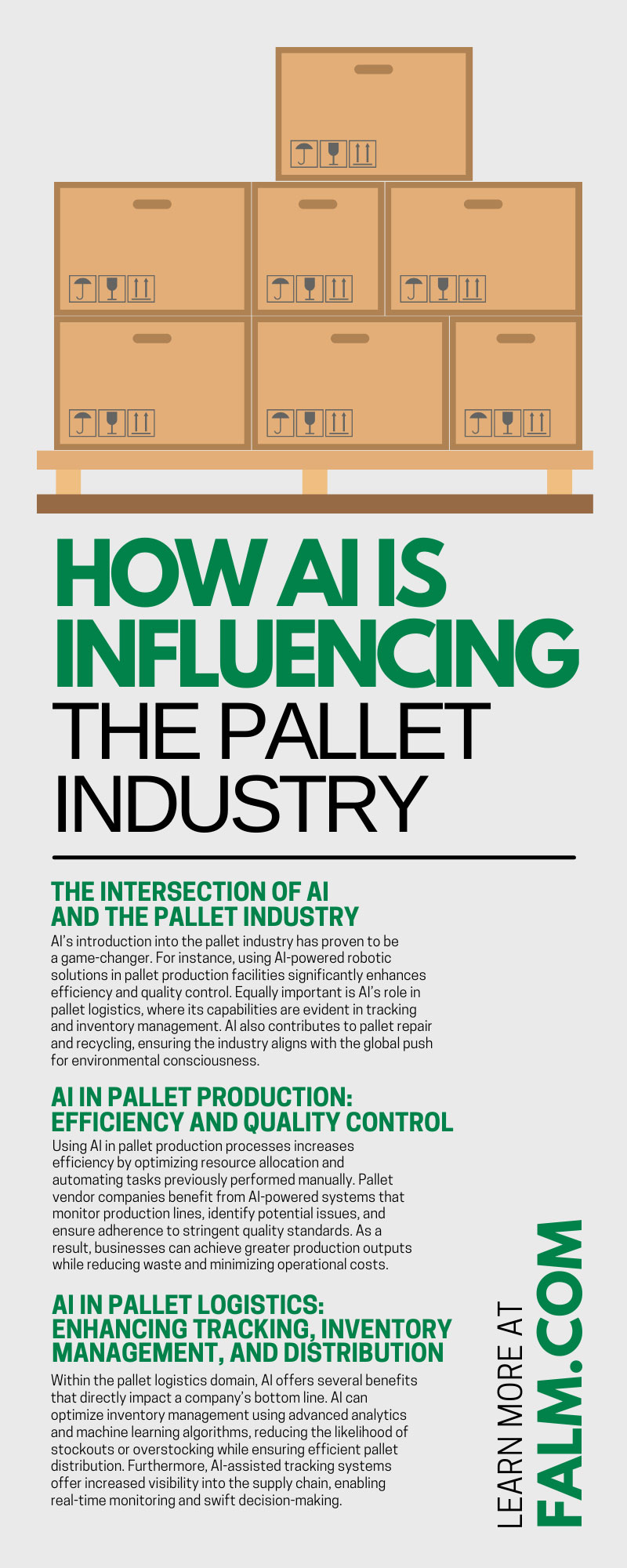- By First Alliance Logistics Management
- October 26, 2023
- Buying Pallets
The logistics and supply chain management world is continually evolving, and artificial intelligence (AI) has become a significant factor in this transformation. The pallet industry is experiencing the remarkable impacts of AI. Implementing AI in various aspects of the pallet industry, from production and logistics to recycling and sustainability, will streamline processes, reduce costs, and contribute to a greener supply chain. Learn more about AI’s influence on the pallet industry, discuss its benefits, and outline potential future developments.
Understanding the Basics of AI: The Evolution of AI Through the Years
Artificial intelligence has made significant strides since its inception, revolutionizing various industries with its wide-ranging applications. In the pallet industry, the emergence of AI has brought forth a new wave of transformative opportunities for businesses. By harnessing the power of AI, companies can optimize their operations, enhance productivity, and drive operational efficiency to unprecedented levels. AI empowers pallet businesses to unlock greater potential and stay ahead in today’s competitive landscape, from automated sorting and inventory management to predictive maintenance and demand forecasting.
Pallet Industry Overview: A Brief History and Current Trends
The humble pallet has been a staple in the logistics and supply chain sectors for decades. As an essential component for transporting and storing goods, pallets play a significant role in modern commerce. Today, the pallet industry faces the challenge of adapting to ever-changing consumer demands and environmental concerns, thus presenting AI implementation opportunities. AI’s potential to increase efficiency, reduce waste, and improve traceability represents a promising solution to these challenges, signaling a new era for the pallet industry.
The Intersection of AI and the Pallet Industry
AI’s introduction into the pallet industry has proven to be a game-changer. For instance, using AI-powered robotic solutions in pallet production facilities significantly enhances efficiency and quality control. Equally important is AI’s role in pallet logistics, where its capabilities are evident in tracking and inventory management. AI also contributes to pallet repair and recycling, ensuring the industry aligns with the global push for environmental consciousness.
AI in Pallet Production: Efficiency and Quality Control
Using AI in pallet production processes increases efficiency by optimizing resource allocation and automating tasks previously performed manually. Pallet vendor companies benefit from AI-powered systems that monitor production lines, identify potential issues, and ensure adherence to stringent quality standards. As a result, businesses can achieve greater production outputs while reducing waste and minimizing operational costs.
AI’s profound impact on quality control within the pallet industry is praiseworthy. It introduces precision and consistency that manual processes can’t match. AI-powered systems can scan and evaluate pallets in real time, accurately identifying defects or irregularities. This extra layer of quality control leads to a drastic reduction in errors and an increase in the overall output quality. Swiftly isolating faulty items saves time and resources, resulting in an improved bottom line. Additionally, AI in quality control isn’t just about achieving higher standards; it’s about fostering a more efficient and sustainable operation.
AI in Pallet Logistics: Enhancing Tracking, Inventory Management, and Distribution
Within the pallet logistics domain, AI offers several benefits that directly impact a company’s bottom line. AI can optimize inventory management using advanced analytics and machine learning algorithms, reducing the likelihood of stockouts or overstocking while ensuring efficient pallet distribution. Furthermore, AI-assisted tracking systems offer increased visibility into the supply chain, enabling real-time monitoring and swift decision-making.
AI in Pallet Recycling and Sustainability
With growing global concerns about environmental sustainability, AI is pivotal in the pallet industry’s push for greener practices. AI-powered robotics can efficiently sort, identify, and repair damaged pallets, considerably enhancing reuse and reducing waste in landfills. Furthermore, AI-powered analytics can help companies identify trends and areas of improvement in their pallet recycling processes, contributing to a more sustainable industry in the long run. You can greatly increase your sustainability as a company by pairing with a pallet vendor that uses AI in their operations.
The Benefits of AI in the Pallet Industry: Cost Savings and Improved Safety
Businesses can unlock many remarkable benefits by implementing AI within the pallet industry. One of the key advantages is cost savings achieved through efficiency improvements, waste reduction, and streamlined logistics. With AI-powered systems, companies can optimize pallet management, ensuring the use of resources effectively and minimizing unnecessary expenses. Furthermore, AI can enhance predictive analytics, enabling proactive maintenance and reducing downtime. Integrating AI technology into the pallet industry opens possibilities, revolutionizing operations and driving sustainable growth.
Furthermore, organizations can establish a more secure working environment for employees in production facilities and warehouses by leveraging AI-enhanced safety measures. These advanced technologies help mitigate potential risks and hazards, significantly reducing workplace accidents and promoting employee well-being and safety. In essence, the infusion of AI into the pallet industry bolsters economic productivity and prioritizes the importance of a safe, conducive workspace, which is ultimately fundamental for any thriving business.
Challenges and Limitations of AI in the Pallet Industry
As with any emerging technology, including AI in the pallet industry presents its fair share of challenges and limitations. Considering various technical hurdles that may arise is crucial when implementing AI. These challenges may include ensuring data availability, seamless integration with existing systems, and managing maintenance costs, which can be particularly daunting for smaller companies.
Moreover, it is important to delve into the ethical and legal considerations surrounding the use of AI in the industry. Addressing data privacy and potential job displacement concerns becomes paramount to ensure a responsible and sustainable implementation of AI in the pallet industry. Companies can harness the full potential of AI while upholding ethical standards and promoting long-term success by carefully navigating these complexities.
Future Perspectives: AI and the Pallet Industry
The future of AI in the pallet industry looks promising, with continued advancements and potential breakthroughs on the horizon. Predicted trends include increased use of collaborative robotics, autonomous vehicles for pallet transportation, and further integration of AI across all aspects of the industry. Potential breakthroughs in AI applications, such as self-healing pallets and advanced predictive analytics, could revolutionize how the industry and pallet vendors produce, transport, and recycle pallets.
AI rapidly transforms the pallet industry, bringing efficiency improvements, cost savings, and sustainable practices. By understanding the basics of AI, studying its application in the pallet industry, and considering future perspectives, we can see the vast potential of this technology. Challenges and limitations come about with any efforts involving innovation; addressing them is key to responsible and successful implementation. With continued advancements and breakthroughs in AI, the pallet industry can become more efficient, sustainable, and innovative. Contact us at First Alliance Logistics Management if you want to grow your stock of pallets and learn how they match with AI technology.


